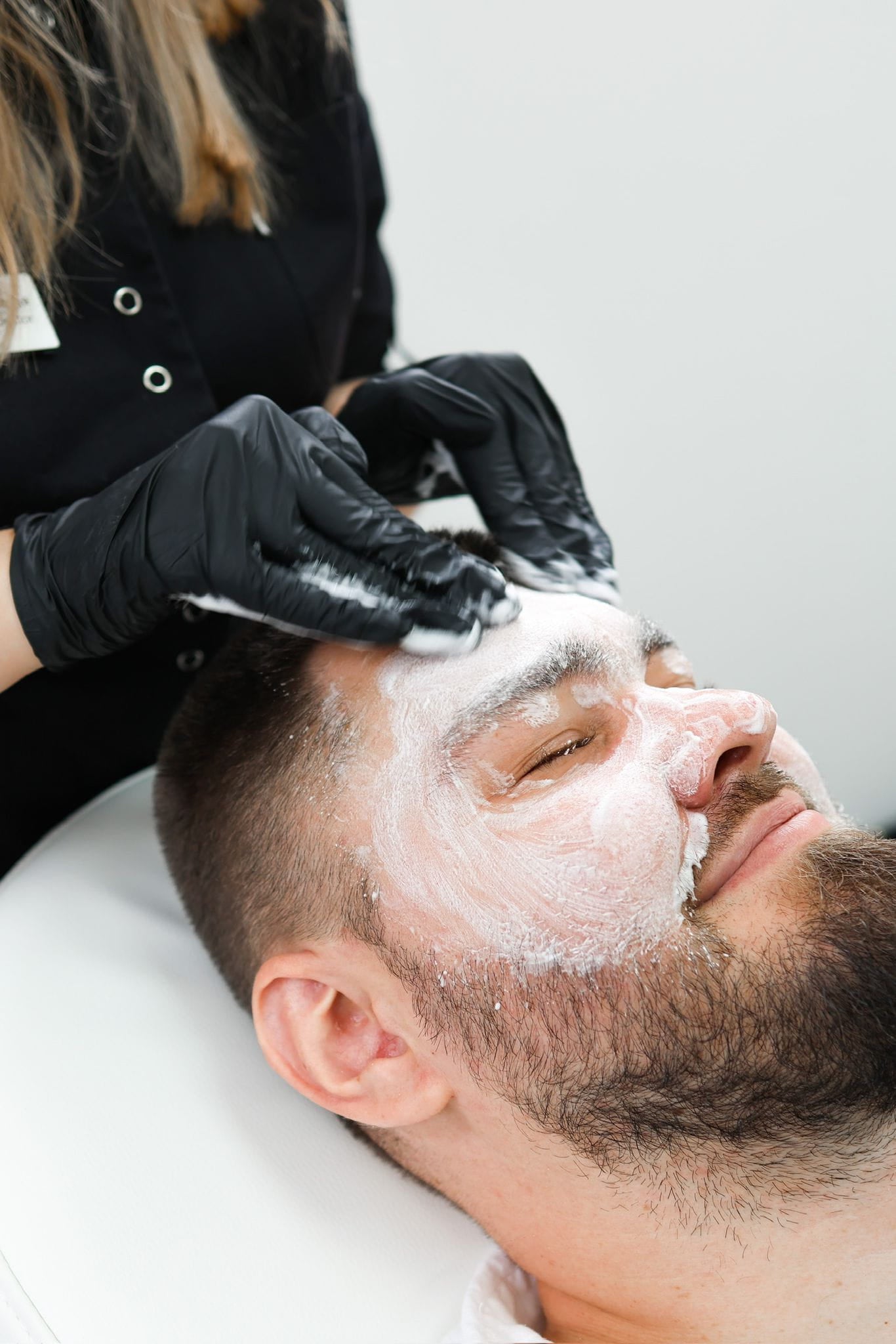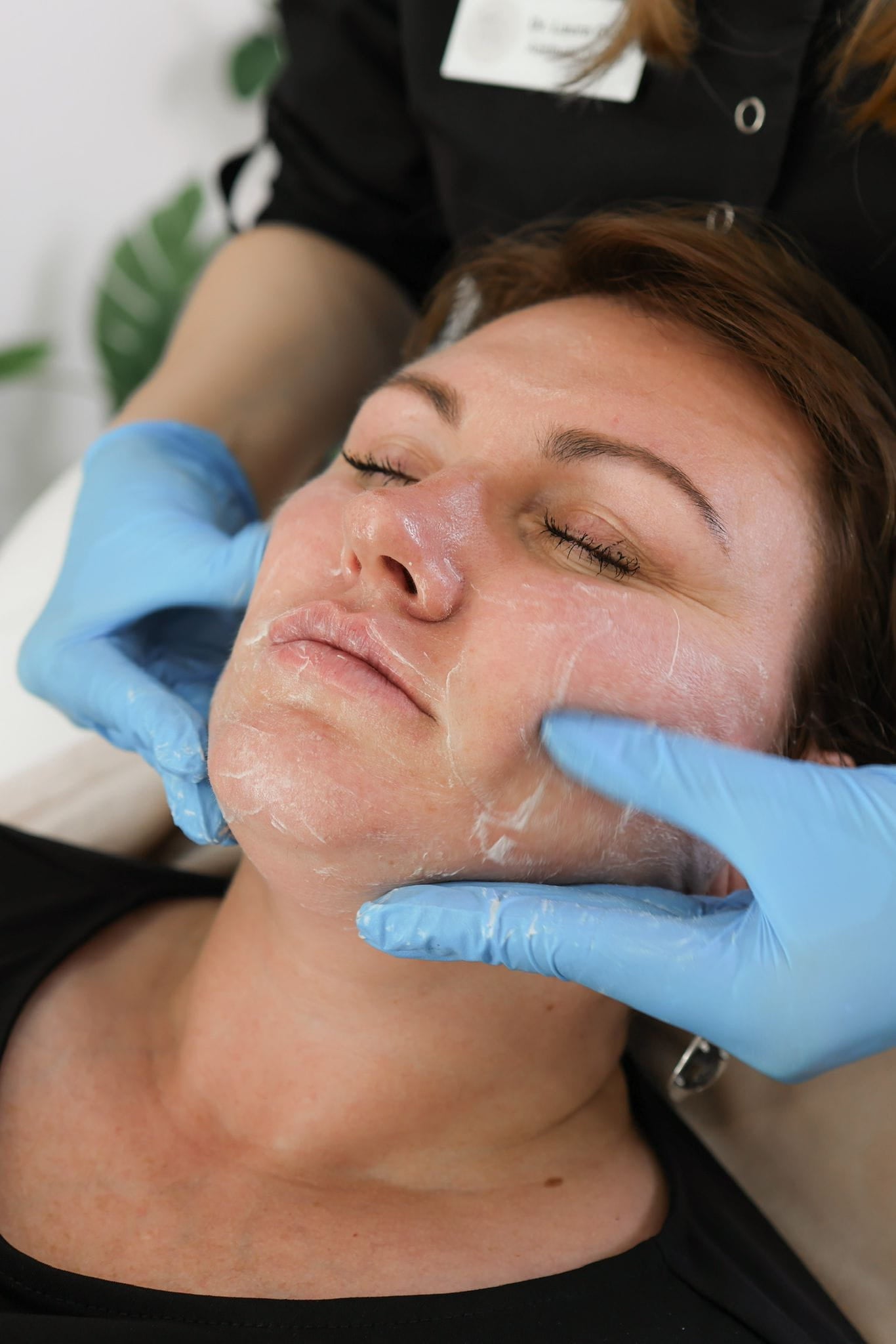Is Cosmelan Depigmentation Peel Suitable For Sensitive Skin In The UK
Cosmelan’s Ingredients and Their Effects on Sensitive Skin
Cosmelan, a popular depigmentation peel treatment, utilizes a blend of active ingredients designed to target melanin production and address pigmentation issues. Its key components include kojic acid, azelaic acid, and glutathione, each known for their skin lightening properties. While these ingredients can be effective, their potency necessitates careful consideration for individuals with sensitive skin.
Active Ingredients in Cosmelan
Cosmelan’s active ingredients, while effective in treating pigmentation concerns, can potentially cause irritation on sensitive skin. Kojic acid, a common ingredient in depigmentation treatments, inhibits tyrosinase, the enzyme responsible for melanin production. While it can lighten skin, it can also lead to redness, itching, and dryness, particularly in those with sensitivities.

Here’s a closer look at Cosmelan’s active ingredients and their potential effects on sensitive skin:
- Kojic Acid: Inhibits melanin production, but can cause redness, itching, and dryness.
- Azelaic Acid: Reduces inflammation and hyperpigmentation, but may lead to tingling or burning sensations in sensitive individuals.
- Glutathione: A powerful antioxidant that brightens skin, but can trigger allergic reactions or sensitivities in some people.
Potential Irritants for Sensitive Skin
The potent nature of Cosmelan’s ingredients necessitates a cautious approach for individuals with sensitive skin. While these ingredients are effective in tackling pigmentation issues, they may cause irritation and discomfort.
Kojic acid, known to inhibit melanin production, can lead to redness, itching, and dryness, particularly in those prone to sensitivity. Azelaic acid, while beneficial for reducing inflammation and hyperpigmentation, might trigger tingling or burning sensations in sensitive individuals.
Glutathione, a powerful antioxidant that brightens skin, can unfortunately trigger allergic reactions or sensitivities in some people.
Sensitivity Variation among Individuals
Cosmelan’s effectiveness stems from its blend of active ingredients: kojic acid, azelaic acid, and glutathione. Each plays a role in addressing pigmentation concerns, but their potency requires careful consideration for those with sensitive skin.
Sensitivity to these ingredients varies greatly among individuals. Some may experience mild irritation, while others might have more pronounced reactions. It’s crucial to understand the potential effects of each ingredient:
Kojic acid, a common depigmentation agent, inhibits melanin production, but can cause redness, itching, and dryness, particularly in sensitive skin.
Azelaic acid, known for its anti-inflammatory properties, can reduce hyperpigmentation. However, it may lead to tingling or burning sensations in individuals with sensitivities.
Glutathione, a powerful antioxidant that brightens skin, has the potential to trigger allergic reactions or sensitivities in some people.

Effectiveness of Cosmelan on Pigmentation Concerns for Sensitive Skin
Cosmelan is a popular depigmentation treatment known for its ability to address pigmentation concerns. While its blend of active ingredients—kojic acid, azelaic acid, and glutathione—offers effective results, individuals with sensitive skin should proceed with caution. These potent ingredients, while beneficial in reducing melanin production, inflammation, and brightening skin tone, can potentially cause irritation and discomfort.
Clinical Studies and Testimonials
The effectiveness of Cosmelan for pigmentation concerns on sensitive skin is a topic of debate. While clinical studies have shown its success in treating hyperpigmentation, there’s limited research specifically addressing its suitability for sensitive skin.

Testimonials from individuals with sensitive skin vary widely, with some reporting positive results and others experiencing irritation or adverse reactions. The potent nature of Cosmelan’s ingredients, including kojic acid, azelaic acid, and glutathione, can potentially trigger sensitivity in those prone to it.
It is crucial for individuals with sensitive skin to consult with a dermatologist before undergoing Cosmelan treatment. A dermatologist can assess their individual skin type and history, and advise on the best course of action. They may recommend alternative treatments or suggest modifications to the Cosmelan protocol to minimize potential irritation.
Realistic Expectations for Pigmentation Reduction
Cosmelan is a potent depigmentation peel that can be effective for addressing pigmentation concerns, but its suitability for sensitive skin requires careful consideration.
- Understanding Cosmelan’s Ingredients: Cosmelan contains kojic acid, azelaic acid, and glutathione, all known for their skin-lightening properties. However, these potent ingredients can potentially trigger irritation and sensitivity in individuals with delicate skin.
- Potential Side Effects on Sensitive Skin: Kojic acid, a common depigmentation agent, can cause redness, itching, and dryness. Azelaic acid, while beneficial for reducing inflammation and hyperpigmentation, may lead to tingling or burning sensations in sensitive individuals. Glutathione, a potent antioxidant, can sometimes trigger allergic reactions or sensitivities.
- Individual Variability: Sensitivity to these ingredients varies greatly among individuals. Some may experience mild discomfort, while others might have more pronounced reactions.
- Consultation with a Dermatologist is Crucial:** Before undergoing Cosmelan treatment, it’s essential for individuals with sensitive skin to consult with a dermatologist. They can assess their skin type and history, determine if Cosmelan is suitable, and advise on potential modifications or alternative treatments.
Realistic Expectations: While Cosmelan can be effective in reducing pigmentation, the extent of improvement may vary depending on individual skin characteristics and treatment response.
Alternative Depigmenting Treatments for Sensitive Skin
For individuals with sensitive skin, the decision to undergo a Cosmelan depigmentation peel requires careful consideration. While Cosmelan is known for its effectiveness in treating pigmentation concerns, its potent ingredients can potentially cause irritation and discomfort on delicate skin.
Alternative depigmenting treatments that may be gentler on sensitive skin include:
- Topical creams containing ingredients like hydroquinone, retinol, or vitamin C. These ingredients work to lighten pigmentation gradually and can be more tolerable for sensitive skin.
- Chemical peels using milder acids like lactic acid or glycolic acid. These peels exfoliate the skin and promote cell turnover, helping to fade pigmentation over time.
- Microdermabrasion, a procedure that uses fine crystals to gently exfoliate the top layer of skin, can help improve pigmentation by promoting cell renewal.
- Laser treatments, such as fractional laser therapy or Q-switched lasers, target melanin in pigmented areas and can be effective for various types of hyperpigmentation. However, these treatments may require multiple sessions and careful consideration due to potential side effects.
It is crucial for individuals with sensitive skin to consult with a dermatologist before trying any depigmentation treatment. They can assess individual skin type and concerns, recommend the most suitable option, and advise on potential risks and benefits.
Safety and Side Effects Associated with Cosmelan on Sensitive Skin
Cosmelan is a popular depigmentation treatment known for its ability to address pigmentation concerns. While its blend of active ingredients—kojic acid, azelaic acid, and glutathione—offers effective results, individuals with sensitive skin should proceed with caution. These potent ingredients, while beneficial in reducing melanin production, inflammation, and brightening skin tone, can potentially cause irritation and discomfort.
Common Side Effects Experienced by Sensitive Skin Types
Cosmelan’s effectiveness stems from its blend of active ingredients: kojic acid, azelaic acid, and glutathione. Each plays a role in addressing pigmentation concerns, but their potency requires careful consideration for those with sensitive skin.
Sensitivity to these ingredients varies greatly among individuals. Some may experience mild irritation, while others might have more pronounced reactions. It’s crucial to understand the potential effects of each ingredient:
Kojic acid, a common depigmentation agent, inhibits melanin production, but can cause redness, itching, and dryness, particularly in sensitive skin.
Azelaic acid, known for its anti-inflammatory properties, can reduce hyperpigmentation. However, it may lead to tingling or burning sensations in individuals with sensitivities.
Glutathione, a powerful antioxidant that brightens skin, has the potential to trigger allergic reactions or sensitivities in some people.
Risk of Complications and Allergic Reactions
Cosmelan is a popular depigmentation treatment known for its ability to address pigmentation concerns. However, its potent ingredients can potentially cause irritation and discomfort on sensitive skin.
The effectiveness of Cosmelan for pigmentation concerns on sensitive skin is a topic of debate. While clinical studies have shown its success in treating hyperpigmentation, there’s limited research specifically addressing its suitability for sensitive skin. Testimonials from individuals with sensitive skin vary widely, with some reporting positive results and others experiencing irritation or adverse reactions.
It is crucial for individuals with sensitive skin to consult with a dermatologist before undergoing Cosmelan treatment. They can assess their individual skin type and history, determine if Cosmelan is suitable, and advise on potential modifications or alternative treatments.
Alternative depigmenting treatments that may be gentler on sensitive skin include topical creams containing ingredients like hydroquinone, retinol, or vitamin C; chemical peels using milder acids like lactic acid or glycolic acid; microdermabrasion; and laser treatments such as fractional laser therapy or Q-switched lasers.
It is important to note that even these alternative treatments may not be suitable for everyone with sensitive skin, and a consultation with a dermatologist is still recommended.
Post-Treatment Care Recommendations for Sensitive Skin
Cosmelan, while effective in treating pigmentation concerns, can pose risks for individuals with sensitive skin. The potent ingredients like kojic acid, azelaic acid, and glutathione can cause irritation, redness, itching, and dryness.
If you have sensitive skin and are considering Cosmelan, it is crucial to consult a dermatologist. They can assess your skin type, discuss potential risks and benefits, and recommend suitable alternatives or modifications to the treatment protocol.
Post-treatment care for sensitive skin following Cosmelan is especially important. Here are some recommendations:
- Gentle Cleansing: Use a mild, fragrance-free cleanser twice daily to avoid further irritation.
- Hydration: Apply a hydrating moisturizer regularly to soothe and protect the skin.
- Sun Protection: Wear broad-spectrum sunscreen with an SPF of 30 or higher daily to prevent further pigmentation and protect sensitive skin from sun damage.
- Avoid Irritants: Steer clear of harsh scrubs, exfoliants, retinoids, and products containing fragrances or alcohol, which can worsen sensitivity.
- Patch Test: Before full treatment, perform a patch test on a small area of skin to gauge your individual reaction to Cosmelan’s ingredients.
- Monitor for Reactions: Pay close attention to any changes in your skin after the treatment and contact your dermatologist if you experience any concerning symptoms.
Availability and Cost of Cosmelan in the UK
The cost of Cosmelan varies depending on the location within the UK and the size of the area being treated. Typically, a full-face treatment can range from £300 to £600 or more.
Availability is dependent on the clinic offering the treatment. Many private clinics and dermatology practices in major cities offer Cosmelan, but its availability might be limited in smaller towns and rural areas.
Licensed Providers and Treatment Centers
Cosmelan is a popular depigmentation peel treatment known for addressing pigmentation concerns. However, its potent ingredients can potentially cause irritation on sensitive skin.
Here’s a closer look at the topic:
Is Cosmelan Suitable for Sensitive Skin?
- Cosmelan’s Active Ingredients:
The treatment utilizes kojic acid, azelaic acid, and glutathione – all known for lightening skin but can trigger irritation on sensitive skin. - Potential Side Effects:
Kojic acid can cause redness, itching, and dryness. Azelaic acid might lead to tingling or burning sensations. Glutathione can trigger allergic reactions in some people. - Individual Variability: Sensitivity varies greatly.
Some experience mild discomfort; others have more pronounced reactions. It’s crucial to understand the potential effects of each ingredient. - Consultation with a Dermatologist is Crucial:
Before undergoing Cosmelan, consult a dermatologist who can assess your skin type and history, determine suitability, and advise on potential modifications or alternative treatments.
Cosmelan’s effectiveness for sensitive skin is debated. While clinical studies show its success in treating hyperpigmentation, there’s limited research specifically addressing sensitive skin. Testimonials vary widely, with some reporting positive results and others experiencing irritation.
Alternative Depigmentation Treatments for Sensitive Skin:
- Topical creams containing hydroquinone, retinol, or vitamin C can be gentler.
- Chemical peels using milder acids like lactic acid or glycolic acid promote cell turnover and fade pigmentation gradually.
- Microdermabrasion exfoliates the skin gently, improving pigmentation by promoting cell renewal.
- Laser treatments like fractional laser therapy or Q-switched lasers target melanin but may require multiple sessions and careful consideration due to potential side effects.
Remember that even these alternatives might not be suitable for everyone with sensitive skin. Always consult a dermatologist for personalized advice.
**Availability and Cost of Cosmelan in the UK:**
Cosmelan is available at various private clinics and dermatology practices across the UK, but availability may vary depending on location.
The cost typically ranges from £300 to £600 or more for a full-face treatment. This can vary based on the clinic’s location, experience, and the size of the area being treated.
Average Cost of a Cosmelan Depigmentation Peel in the UK
Cosmelan is a popular depigmentation peel known for addressing pigmentation concerns but its potency means it can potentially cause irritation on sensitive skin.
Here’s a closer look at the topic:
Is Cosmelan Suitable for Sensitive Skin?
- Cosmelan’s Active Ingredients: The treatment utilizes kojic acid, azelaic acid, and glutathione – all known for lightening skin but can trigger irritation on sensitive skin.
- Potential Side Effects: Kojic acid can cause redness, itching, and dryness. Azelaic acid might lead to tingling or burning sensations. Glutathione can trigger allergic reactions in some people.
- Individual Variability: Sensitivity varies greatly. Some experience mild discomfort; others have more pronounced reactions. It’s crucial to understand the potential effects of each ingredient.
- Consultation with a Dermatologist is Crucial: Before undergoing Cosmelan, consult a dermatologist who can assess your skin type and history, determine suitability, and advise on potential modifications or alternative treatments.
Cosmelan’s effectiveness for sensitive skin is debated. While clinical studies show its success in treating hyperpigmentation, there’s limited research specifically addressing sensitive skin. Testimonials vary widely, with some reporting positive results and others experiencing irritation.
Alternative Depigmentation Treatments for Sensitive Skin:
- Topical creams containing hydroquinone, retinol, or vitamin C can be gentler.
- Chemical peels using milder acids like lactic acid or glycolic acid promote cell turnover and fade pigmentation gradually.
- Microdermabrasion exfoliates the skin gently, improving pigmentation by promoting cell renewal.
- Laser treatments like fractional laser therapy or Q-switched lasers target melanin but may require multiple sessions and careful consideration due to potential side effects.
Remember that even these alternatives might not be suitable for everyone with sensitive skin. Always consult a dermatologist for personalized advice.
Availability and Cost of Cosmelan in the UK:
Cosmelan is available at various private clinics and dermatology practices across the UK, but availability may vary depending on location.
The cost typically ranges from £300 to £600 or more for a full-face treatment. This can vary based on the clinic’s location, experience, and the size of the area being treated.
Alternatives to Cosmelan for Sensitive Skin in the UK
Cosmelan is a popular depigmentation peel treatment known for its ability to address pigmentation concerns. However, individuals with sensitive skin should proceed with caution as its potent ingredients can cause irritation.
Before considering Cosmelan, it’s crucial to consult a dermatologist. They can assess your skin type and history, determine if Cosmelan is suitable, and advise on potential modifications or alternative treatments.
Here are some gentler alternatives for sensitive skin:
- Topical Creams: Look for creams containing hydroquinone, retinol, or vitamin C. These ingredients can help lighten pigmentation gradually and are generally milder on sensitive skin.
- Chemical Peels (Mild Acids): Consider chemical peels using lactic acid or glycolic acid. These acids exfoliate the skin gently and promote cell turnover, leading to improved pigmentation over time.
- Microdermabrasion: This non-invasive procedure uses fine crystals to gently exfoliate the top layer of skin, promoting cell renewal and fading pigmentation.
- Laser Treatments (With Caution): Some laser treatments, like fractional laser therapy or Q-switched lasers, can target melanin effectively. However, they might require multiple sessions and should be discussed carefully with a dermatologist due to potential side effects on sensitive skin.
Remember that even these alternative treatments might not be suitable for everyone with sensitive skin. Always consult a dermatologist for personalized advice before trying any depigmentation treatment.
- Why Can’t You Exercise After Lip Filler - November 3, 2025
- What Is The Best Age To Start Considering Bum Filler Injections? - November 2, 2025
- What Are CBD Infused Gummies And How Do They Work - October 30, 2025
